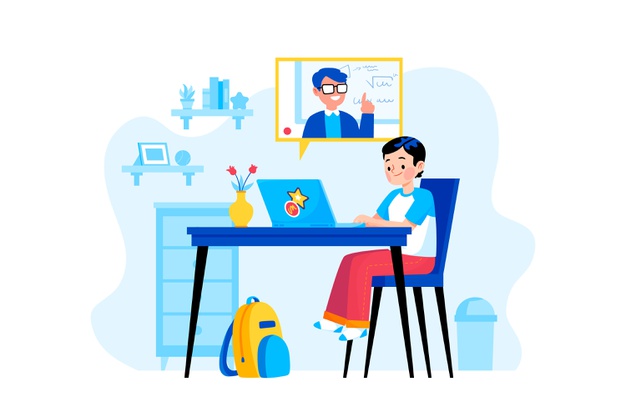Coronavirus pandemic has brought a change in our lifestyle, and the education system is no different. To reassure that children don’t miss on an academic year, school education across the country has shifted to virtual classrooms. Children have to follow virtual classes at home adapting to a change from traditional classroom-based school education to virtual classes. This shift can be quite tiring for both parents and children, raise the anxiety levels, and cause stress symptoms.
Though a certain level of stress may help students to adapt to new environments, learn, and grow. But when these young minds are exposed to repeated signs of stress it can become an emotionally difficult situation.
Stress in Kids
Stress levels in children are a more cause of concern, unlike adults, who can communicate how stress symptoms affect their lives, children attending virtual classes at home may not even understand or have the words to explain how they are feeling. Kids may show signs of stress due to a poor internet connection, time-constraints, lack of physical proximity of their friends, and an unfavorable study environment.
Due to stress, parents need to be extra cautious and be vigilant about the behavioral changes they might observe in their kids like defiance, or withdrawal, refusals, and opposition to adapt to the change. Some kids may find it difficult to adjust and fall further behind, thus parental support and guidance are very crucial to make virtual classes a success for young minds.
Signs of Stress Disorders
When stress becomes unmanageable for the kids, it can lead to mood disorders, which affects 1 in 5 children. Here are the worrying signs of stress disorders which parents need to be cautious about-
- Depression
Primary symptoms of depression affect the regular growth of a kid who is attending virtual classes. Depression signs may include irritability, loss of sleep, and mood swings.
- Generalized Anxiety Disorder (GAD)
Kids may show restlessness and find it troubling to concentrate on their studies. These are the symptoms of generalized anxiety disorder that cause uncomforting situations over past or future events involving their peers and school friends.
- Panic Disorder
Panic disorders cause unexpected episodes of intense anxiety. Kids who suffer from panic disorder may experience sweating, loss of control feeling, heart palpitations and shortness of breath.
- Sleep Disorder
Sleep disorder occurs when your kid is unable to sleep and faces abnormal sleep patterns that interrupt physical, emotional, and mental health. Stress and anxiety can cause acute sleep disorders like insomnia, sleep apnea, and excessive sleepiness.
- Post-traumatic Stress Disorder (PTSD)/Acute Stress Disorder (ASD)
The symptoms of PTSD include anxiety, difficulty functioning, or intrusive thoughts, which are normal reactions to trauma. PTSD occurs when the kids are negatively affected. A less severe form of PTSD is Acute Stress Disorder, triggered by a stressful event like COVID-19 but the effect is short term.
Stress Symptoms in Kids
- Nail-biting
- Refusing to attend virtual classes
- Physical aggression
- Crying often
- Difficulty sleeping
- Headaches
- Fatigue, aches, and pains
- Change in appetite
- Upset stomach
- Bedwetting
- Nightmares
- Worrying/anxiety
- Fidgeting
Coronavirus Stress Relief Tips for Parents
Here are the stress buster tips for parents to help their children cope with virtual classroom stress:
Encourage Conversations
Talk with your children regularly, discuss their feelings, and be patient while speaking with them. This will help them to share their fears and concerns with you. Encourage them to talk about their daily routines and their study progress.
Create an Environment
For a conducive virtual class environment, depending on the age of your child, aim to engage them for a disciplined hour of schoolwork. It is advisable not to recreate a strict school day with six to seven hours of curricular content. Shorter, crisp content will prove to be less stressful and help your kids to enjoy virtual classes.
Be Attentive to Children
Parents should be emphatic while helping their children adjust to this new learning schedule. They must understand that virtual classes will not always go well. Accordingly, they must be prepared for their child’s needs and assist them to cope up. The guide is to be attentive and help children with their study schedules.
Incorporate Exercises
Medical experts recommend that children must at least practice one hour of exercise every day to strengthen their cardio fitness and keep coronavirus stress depression and anxiety at bay. Parents should encourage their young kids to exercise by limiting the screen time and practice exercise and yoga to beat the signs of stress.
Social Interaction
Children are used to a lot of social interaction at their school, with regular sports and physical activities. It is certain that they will feel the stressful effects of social distancing. While currently, it might not be safe to let your kids go out and play, for the fear of surface contamination of Coronavirus. What you can do is, let them interact with their friends over a video call, beyond text messaging or social media.
Ensure Sleep
A regular hour of sleep is as important as a balanced diet. Sleep improves physical and emotional health, and reduces inattention, aiding to their memory skills. Lack of sleep can also cause depression, irritability, and mood swings. So how much should your kid sleep? The American Academy of Paediatrics guides that children aged 6-12 must get a minimum of 9-12 hours of sleep at night, while teens should have an uninterrupted sleep of 8-10 hours.
Model Self-Care
Your kids emulate you and follow you, make sure you get enough sleep and eat nutritious food and exercise. These self-care strategies will help your kids to stay fit and concentrate on their studies.
Virtual Consultation with Gigadocs
With the increase in the number of cases, we may walk over to lockdown 2.0 to ensure the safety of your kids. Consider E-healthcare and virtual consultations over the traditional face to face appointments. Telehealth is a safe consultation, that slows the spread of COVID-19. Consult a digital specialist on the Gigadocs practice management app. Book a Digital Gastroenterologist, infectious disease specialist, or dietitians for your kids and your family on the Gigadocs app.
- You can record your vitals like blood pressure, temperature, heart rate, and discuss them live with your digital doctor on a virtual telephone call.
- Gigadocs will remind you of your follow–up appointment details over notifications, so you won’t miss any of them.
Gigadocs is available to download from the Appstore and Playstore-
Book a Virtual Consultation- Download Gigadocs app from-
- IOS App – apple.co/2W2iG4V
- Android App – bit.ly/33AQoRC
To know more and schedule a Virtual Consultation demo, e-mail, at info@gigadocs.com




